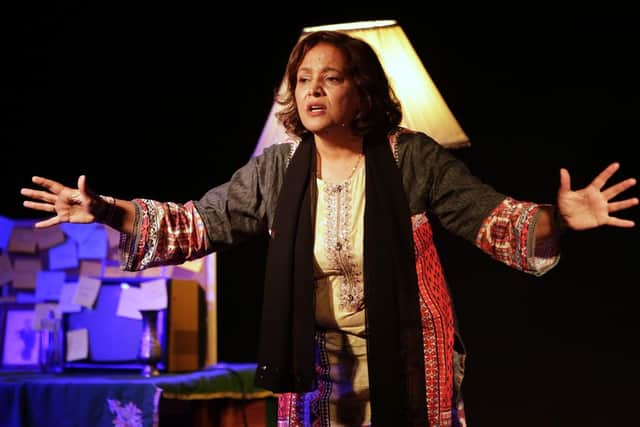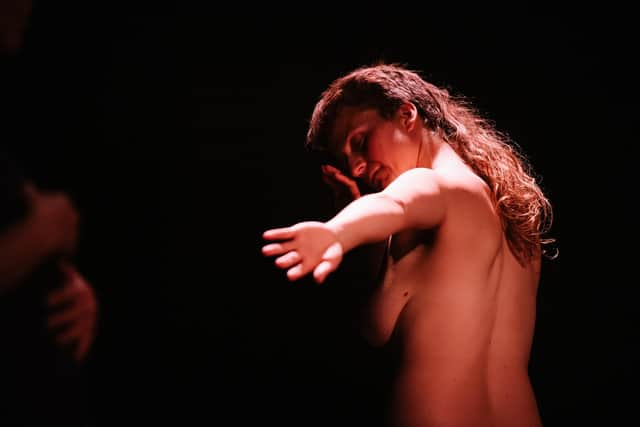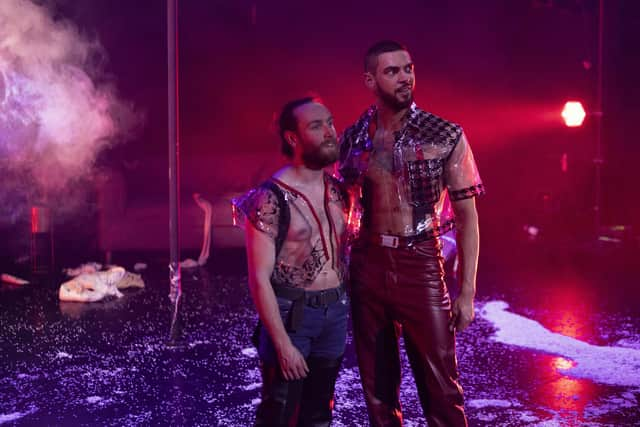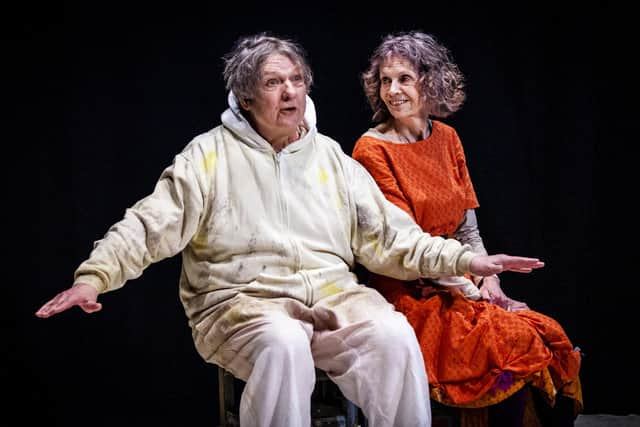10 Fringe performers on how to improve the world's biggest arts festival
Lubna Kerr: ‘We need more people of colour on stage’
As a child, I was taken to the old Pitlochry Theatre and dreamt of being up there, playing Lady Bracknell (I have many handbags). Sadly, though years have passed, the diversity on stage and among audiences remains static.
Last year, I received Creative Scotland funding to write my Fringe show Tickbox and engaged with communities of colour to encourage them to come to the theatre and identify barriers. I even went to a picnic in Saughton Park to meet the Asian ladies, sharing their lovely Pakistani food – well, someone has to do it.
Advertisement
Hide AdTwo major issues were the lack of relatable storylines and the shortage of people of colour on stage. The research worked: I had six sold-out shows, and 80% of the Saturday audience were people of colour. It was fantastic to many people who had the same skin shade as me, and it wasn’t out of a bottle.
However, to maintain this level of interest, festivals and funders need consistent engagement, not one-offs. And now is the time to do it, with theatre urgently needing new audiences to rebuild after Covid. Scotland is a multicultural, diverse society, and engaging with communities of colour produces a diversity of work. I want to write stories that rely on my experiences, not skin colour. However, my experiences are related to the colour of my skin. A thriving future for Edinburgh’s festivals needs both more people of colour on stage, and for performers to see more people like themselves in the audience.
Lubna Kerr’s show Tickbox is at Summerhall, 16-28 August, 8.55pm
Kiri Pritchard Maclean: ‘Stream more shows online’


Even the most educationally resistant of us have learnt something from two years of being locked in our house; you’ve probably cracked a sourdough starter method, or at least firmed up a working theory as to the whereabouts of Carol Baskin’s husband. I’m proud to say that the comedy industry seems to have held onto one pretty vital life lesson. It’s still turning a blind eye to rampant sexual assault and pretending that a commitment to championing working-class voices is an optional extra like electric windows, but Rome wasn’t built in a day.
Accessibility is an area I think comedy has strayed into through necessity, and thankfully, it’s decided that water is warm enough to keep swimming – I should say cold enough, because I now don’t know anyone above 25 in comedy who swims in water that isn’t also suited to Arctic char.
Comedy went online, and it’s nice to see that for lots of comedians and venues, it never went back. The Fringe has long been an international festival, and now it truly can be global with shows in most venues being streamed online by lockdown heroes NextUp. This doesn’t just allow acts to build or cater to existing international audiences. It can also provide a sample of the Fringe experience to people in the UK who may not have been able to commit to the Fringe. It’s a long, expensive month in a city chocked full of buildings that were created long before disabled access was considered mandatory – and by that I mean pre-2010. Online comedy is a game changer for everyone.
Advertisement
Hide AdKiri Pritchard Maclean: Home Truths, Monkey Barrel, 7.05pm, until 28 August


Sarah Hopfinger: ‘Listen to disabled people’
The emergency of the pandemic initiated much-needed conversations about access and visibility in the arts. While I welcome this, I think that the wider arts sector must listen to disabled and other marginalised voices not merely to make the arts more inclusive but also because different bodies and minds push art forms in new directions.
Advertisement
Hide AdMy show Pain and I is a bold and intimate autobiographical body of work that puts chronic pain experience centre stage and asks: what can pain teach us? It is a response to my need – and the need of other people – for a creative space to acknowledge, share and celebrate the complexities of living with pain. I began making the work before lockdown, yet the question that I had been grappling with seemed ever more relevant: how do we care for ourselves and each other in times of personal and collective crisis?
I have tried to embrace chronic pain experience as the driving force of Pain and I. Access is embedded, and it offers itself at the Fringe as live performance, audio experience, digital graphic score, and visual publication. It can be accessed live or remotely, and aims to contribute to a less ableist, more kind and radically inclusive world.


Sarah Hopfinger’s show Pain and I is at Summerhall, 1.25pm, until 28 August
Sadiq Ali: ‘We need to see more work that challenges our perceptions’
The pandemic taught us one thing. If we band together against something that affects us all, we can make quick and decisive change. We let real issues take centre stage, for just a moment in time. When we were at home, we had time to see injustices in our systems, to rally in outrage and anger at the way minority groups were treated, both in the past and now through our own reinforcement. We came together, we protested and we felt our hearts and minds touched.
Now we face other issues, and is anyone stopping to notice? The LGBTQ community faces an outbreak of monkeypox that is spreading rapidly in the UK, but vaccine roll-out is slow. Recently, 30,000 people gathered for Trans Pride in London with no mainstream media coverage whatsoever. We have wars raging that spend a few weeks as headlines and then we get bored – our attention spans moving back to the Kardashians, takeout coffees and delays in public transport.
Advertisement
Hide AdF*** this. Don’t let ignorance be your Fringe. See work that challenges your perceptions, commit to artists who expand your experience, and look at topics that can move you. Then share that, share those moments of growth, those sparks of passion, and drive to make lasting change.
Sadiq Ali’s show The Chosen Haram is at Summerhall, 9pm, until 27 August


Jo Clifford: ‘Stop exploiting artists’
Advertisement
Hide AdI remember during lockdown expressing the pious hope that when it came back, the Fringe would be a gentler, kinder place. Fool that I was.
And yes, Fringe Society, all your pious words about the Fringe being “one of the greatest annual celebrations of culture and creativity in the world” are absolutely right. But it’s also still damaging and competitive and nasty and exploitative, and absolutely relies on the idealism of artists working for nothing to make loads and loads of money for everyone else.
And the beautiful idealism and pride of its founders has been twisted and distorted by an especially vicious capitalist model of arts production, and if I had any sense I would have nothing to do with it.
But here I am, again, full of foolish idealism and pride, and all I can do is try to make sure the work I produce is ready and beautiful, and is created by me and my fellow artists in a way that doesn’t exploit anyone or damage the world, and that we work in a lovely venue that really supports its artists. And that what audiences see will give joy and pleasure, and maybe in its tiny way even change the world for the better.
Jo Clifford’s collaboration with Maria McDonell, The Not So Ugly Duckling: A Play For Grownups, is at the Scottish Storytelling Centre, 4.45pm, 11-27 August (not all dates)
Simon Munnery: ‘Take the Fringe outdoors’
I’ve been coming to Edinburgh for so many years the council has awarded me an honorary parking permit. Not. And every year come September I am ill; it’s not surprising really – thousands of people from all over the world jamming themselves into tiny rooms and breathing the same air. I regard it as an occupational hazard. I’m going to get sick, but I fight it off with adrenaline and Dr Theatre until the bell clangs for the beginning of September. Then I collapse for a week. In a way perhaps it’s good, a workout for the immune system. But maybe the Fringe could be more outdoorsy, more Glastonburyesque – more outdoor venues, spaces for congregating – St Andrew’s Square! Queen Street Gardens! Holyrood! The Meadows! Also, I found a one-bedroom central flat on Airbnb for a month costing £99,000. May we have a stretch of land given over in perpetuity to the poor of the world for camping in August please? And finally the tram should be extended to Portobello.
Advertisement
Hide AdSimon Munnery: Trials and Tribulations, Stand Comedy Club, 3.15pm, until 28 August
Henry Naylor: ‘We need to support smaller venues’
My experience at post-pandemic Fringes is that the public are a little more risk-averse. They’ll go to venues they trust, and will see acts they know and love. But they’re less likely to go to venues they’re unfamiliar with, or take a risk on an unknown performer. I suspect the punters are saying to themselves: we want to see the Fringe, but we’re not taking the risk of sitting in a hot and potentially germ-filled room unless we KNOW it’s going to be worth it.
Advertisement
Hide AdIn these circumstances, I’d like to see the Fringe help the little venues. Create a special ‘passport’ ticket – where the public can pay, say, £20, which gives them five tickets to any available shows of their choosing at the less well-known venues.
It may mean that the public end up seeing some bad shows… but it may also mean they discover some unknown diamonds. Which, after all, is when the Fringe is at its most exciting.
An initiative like this will help the smaller venues and acts, which are getting increasingly squeezed by the bigger, and increasingly professional, six to eight venues.
Henry Naylor’s new play Afghanistan Is Not Funny is at Gilded Balloon Teviot, 4pm, until 29 August
Luke Wright: ‘The Free Fringe needs public funding’
Much of the Fringe runs on a shoestring. Many of the smaller venues struggle to survive and rely on the help of volunteers; technicians are paid very basic rates; flyerers pound the pavements for minimum wage, and often much less. But surely no one struggles as much as the average Fringe performer?
It’s somehow become an accepted norm that performers are left thousands of pounds in debt after each festival, yet it is their creativity, panache and brilliance that has made and continues to make the Fringe the magical thing it is. From unscrupulous landlords and letting agents to the capitalist big-venue owners, there are plenty of people getting rich off the Fringe, getting rich off the art of artists who are so ground down come September that many never perform again.
Advertisement
Hide AdI do think the Free Fringe is step in the right direction, though. Imagine what it could do with a few thousand pounds of arts funding to help professionalise its venues, pay technicians and make it a viable option for more technically ambitious works. A well-organised. publicly funded Free Fringe could perhaps see off the ugly capitalist version that currently bankrupts artists and lines the pockets of the sharks.
Luke Wright: The Remains of Logan Dankworth, Pleasance Courtyard, 3.45pm, until 29 August. Luke Wright: Late Night Dance Floor Fillers (Poems), Pleasance Dome, 11pm, until 29 August
Advertisement
Hide AdAlice Mary Cooper: ‘Make culture part of the fight for climate justice’
As an artist, I am fortunate to have been selected to present my show The Bush as part of the Made in Scotland programme this year. This means that I am lucky to be supported by funding to bring my show to Summerhall during the Fringe. The funding contributes to venue hire, alongside having a team to support the show. It pays for the wages of myself and this team, and will mean that this is the first time taking part in the Fringe without being out of pocket. I won’t be working an additional two jobs in August, where I essentially worked to perform.
Over the past few years, the idea of living to work has come into question. As an industry, it’d be great if more was done to even out the playing field to make the arts, and those partaking in it, more accessible, resourced and sustainable. This also comes down to a question of inclusion. The last few years have shone a light on the struggles for environmental and racial justice, and we as humans need to be activists in championing change. I believe wholeheartedly in centring culture in the fight for climate justice, for example, and sharing this vision too.
Alice Mary Cooper’s show The Bush is at Summerhall, 3pm, 16-28 August
Glenn Moore: ‘Make audiences play a Royal Mile-based flyering video game’
In this increasingly digitised society, it should be illegal to flyer on the Royal Mile, but as a trade-off, all attendees of the Fringe need to play a Royal Mile-based video game where your character must run that gauntlet while being pelted with flyers. It’s basically dodgeball but with a cappella leaflets, but if you get to the end flyer-free, you get a discounted ticket to a show you want to see. If you do get caught in-game by a flyerer, you need to politely listen to their whole spiel. This would cut down drastically on paper usage, and you don’t need to make eye contact with anyone. If you’ve never been to the Fringe, do walk through the Royal Mile – flyering there can be a truly demoralising experience, but it’s an explosive sensory experience to walk through as a punter at least once. If you do need to cut through the Royal Mile with no flyers, here’s what to do: while openly carrying a baseball bat or grenade is frowned upon, go headphones in, backpack on with both hands gripping the straps, walk not necessarily quickly but with purpose, eyes looking slightly above the forehead of the tallest person.
Glenn Moore: Will You Still Need Me, Will You Still Feed Me, Glenn I’m Sixty Moore, Pleasance Courtyard, 4.05pm, until 28 August